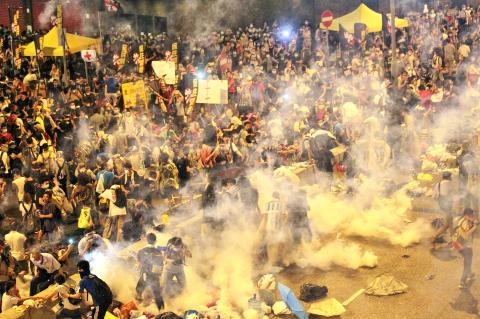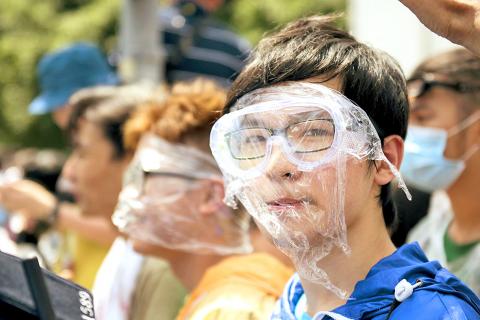Hong Kong police fired repeated volleys of tear gas to disperse pro-democracy protests yesterday and baton-charged the crowd blocking a key road in the government district after issuing official warnings against illegal demonstrations.
The territory’s Admiralty district had descended into chaos as chanting protesters converged on police barricades surrounding colleagues who had earlier launched a “new era” of civil disobedience to pressure Beijing into granting full democracy to Hong Kong.
Police, in lines five-deep in places and wearing helmets and gas masks, staged repeated pepper spray attacks and shot tear gas into the air. The crowd fled several hundred meters, scattering their umbrellas and hurling abuse at police, calling them “cowards.”

Photo: REUTERS
However, demonstrators returned and by early evening, tens of thousands of protesters were thronging streets, including outside the prominent Pacific Place shopping mall that leads toward the Central financial district.
Fresh rounds of tear gas cleared some of the roads in Admiralty and pushed protesters toward Central.
Police had not used tear gas in Hong Kong since breaking up WTO protests against South Korean farmers in 2005.

Photo: AFP
Clouds of tear gas also blew back toward police lines, but it is unclear how many people on either side have needed treatment.
“We will fight until the end... We will never give up,” said Peter Poon, a protester in his 20s, adding that they may have to execute a temporary retreat as night falls.
Hong Kong Chief Executive Leung Chun-ying (梁振英) pledged “resolute” action against the protest movement known as Occupy Central with Love and Peace.
“The police are determined to handle the situation appropriately in accordance with the law,” Leung said just hours before the charge.
A spokesperson for China’s Hong Kong and Macau Affairs Office added that the government in Beijing fully supported Hong Kong’s handling of the situation “in accordance with the law.”
Inside the cordon, thousands had huddled in plastic capes, masks and goggles as they waited for a fresh police charge to clear the area before Hong Kong was to open for business this morning.
However, Beijing last month rejected demands for Hong Kongers to freely choose the territory’s next leader, prompting threats from activists to shut down Central.
China is thought to want to limit elections to a handful of candidates loyal to Beijing.
While promising a fresh round of public consultation, Leung also described Beijing’s decision as “legally binding.”
Publishing tycoon Next Media Group (壹傳媒集團) chairman Jimmy Lai (黎智英), a key backer of the pro-democracy movement, said he wanted as big a crowd of protesters as possible to thwart any crackdown after a week of student demonstrations.
“The more Hong Kong citizens come, the more unlikely the police can clear up the place,” said Lai, also wearing a plastic cape and workmen’s protective glasses.
“Even if we get beaten up, we cannot fight back. We will win this war with love and peace,” he said.
Organizers said as many as 80,000 people thronged the streets in Admiralty, galvanised by the arrests of student activists on Friday. Police have so far arrested 78 people, including Joshua Wong (黃之鋒), the 17-year-old leader of student group Scholarism, who was dragged away after he called on the protesters to charge the government premises. He was still in detention yesterday.
His parents said in a statement the decision to detain him was an act of “political persecution.”

The Ministry of the Interior (MOI) is to tighten rules for candidates running for public office, requiring them to declare that they do not hold a Chinese household registration or passport, and that they possess no other foreign citizenship. The requirement was set out in a draft amendment to the Enforcement Rules of the Public Officials Election and Recall Act (公職人員選舉罷免法 ) released by the ministry on Thursday. Under the proposal, candidates would need to make the declaration when submitting their registration forms, which would be published in the official election bulletin. The move follows the removal of several elected officials who were

The Republic of China (ROC) is celebrating its 114th Double Ten National Day today, featuring military parades and a variety of performances and speeches in front of the Presidential Office in Taipei. The Taiwan Taiko Association opened the celebrations with a 100-drummer performance, including young percussionists. As per tradition, an air force Mirage 2000 fighter jet flew over the Presidential Office as a part of the performance. The Honor Guards of the ROC and its marching band also heralded in a military parade. Students from Taichung's Shin Min High School then followed with a colorful performance using floral imagery to represent Taiwan's alternate name

COVETED PRIZE: The US president would be a peace prize laureate should he persuade Xi Jinping to abandon military aggression against Taiwan, William Lai said US President Donald Trump should get the Nobel Peace Prize should he be able to convince Chinese President Xi Jinping (習近平) to abandon the use of force against Taiwan, President William Lai (賴清德) told a conservative US radio show and podcast in an interview. The US is Taiwan’s most important international backer, despite the absence of formal ties, but since Trump took office earlier this year he has not announced any new arms sales to the nation. Trump could meet Xi at the APEC summit in South Korea on Oct. 31 and Nov. 1. Lai, speaking on The Clay Travis and Buck Sexton

A Chinese takeover of Taiwan would severely threaten the national security of the US, Japan, the Philippines and other nations, while global economic losses could reach US$10 trillion, National Security Council Deputy Secretary-General Lin Fei-fan (林飛帆) wrote in an article published yesterday in Foreign Affairs. “The future of Taiwan is not merely a regional concern; it is a test of whether the international order can withstand the pressure of authoritarian expansionism,” Lin wrote in the article titled “Taiwan’s Plan for Peace Through Strength — How Investments in Resilience Can Deter Beijing.” Chinese President Xi Jinping’s (習近平) intent to take Taiwan by force